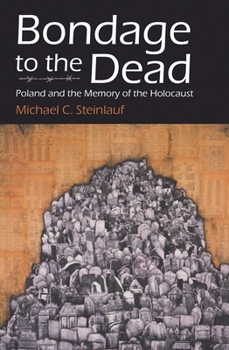Book Overview
A summary of Polish-Jewish relations up to and during the Holocaust outlines how the Polish people were involved in the Holocaust as witnesses, the subsequent denial of involvement after the war, and the communist manipulation of Holocaust memory in the struggle between the Solidarity movement and the Polish government.
Format:Paperback
Language:English
ISBN:0815604033
ISBN13:9780815604037
Release Date:March 1997
Publisher:Syracuse University Press
Length:228 Pages
Weight:0.66 lbs.
Dimensions:0.6" x 5.6" x 8.5"
Customer Reviews
3 ratings
Best of its Kind; Ultimately Inspiring
Published by Thriftbooks.com User , 16 years ago
I've read hundreds of books and articles on Polish-Jewish relations, published in several different countries and languages. In that avalanche, Michael C. Steinlauf's "Bondage to the Dead: Poland and the Memory of the Holocaust" stands out. It is one of the most fair. "Bondage" is the best one-volume introduction to Polish-Jewish relations in the post-Holocaust era. There is an amazing amount of information, treated swiftly, deftly, and responsibly. Much of the material is from underground or hard-to-find sources. If you don't read Steinlauf, you may miss this goldmine. Not just persons interested in Polish-Jewish relations would benefit from this book. Anyone interested in the human psyche under the worst conditions imaginable will find much to challenge, sadden, and, ultimately, inspire. Writing about Polish-Jewish relations is hard. Both Poles and Jews have a tradition of disputativeness. David Ben Gurion is said to have said, "Two Jews, three opinions." Poles are similar. Debate, verging into contrariness, is a value. No matter what you say about Polish-Jewish relations, there is a Pole or a Jew who will stand on a chair and shout that you are completely wrong, and voicing some conspiracy theory. Traditional disputativeness was exacerbated by the unparalleled suffering endured during the Holocaust. Had the Shoah not taken place in Poland, and had Poles "merely" endured what the Nazis and Soviets did to them, Poles would be acknowledged as one of the most martyred, and heroic, peoples in history. But, even as Poles were being rounded up into camps like Auschwitz, tortured, and murdered, even as Polish churches, museums, and even factories and forests were being methodically destroyed, even as Polish children were being gassed or deported, Jews were being annihilated. That planned, and almost completed, total annihilation of Jews has caused the world to be less aware of Polish suffering. In the interwar era, between WW I and II, various factors, outlined by Steinlauf, contributed to a rise of unprecedented anti-Semitism in Poland. This historic "perfect storm" -- so contrary to Poland's tradition of tolerance -- could not have occurred at a worse time. America, overwhelmed by immigration, responded with Scientific Racism, and closed its doors to Jews. And Hitler was just next door, in Germany. Poles and Jews are performers on a world stage. Their audience: Americans and Western Europeans -- whose leaders responded all too late to the Holocaust, and where the "dumb Polack" stereotype impedes understanding -- have often been eager to make profoundly unhelpful and unintelligent comments. One example, cited by Steinlauf, is the tendency for even canonical newspapers like the "New York Times" to refer to "Polish concentration camps." Steinlauf also points out that Poland was effectively betrayed and abandoned by its Western allies at Yalta. Many "isms" are at play here: Fascism, Racism, Zionism, Catholicism, Communism, Judaism, National
Don't go to Poland without reading this book.
Published by Thriftbooks.com User , 22 years ago
I've recommended this book to everyone I've encountered who is going to Poland, or even a little bit interested in the history of Jews in Poland. There are a number of other excellent and interesting books I recommend, too, but I always say that if people have time for only one book before their trip to Poland, that book must be "Bondage to the Dead." In this concise, highly accessible volume, you can get a strong grasp of the entire historical and social landscape that shaped Polish-Jewish relations. Without this foundation, I think it would be hard for the otherwise uninitiated to understand some of the complex issues that continue to simmer today in Poland regarding the memory and legacy of Jews. Steinlauf also manages to offer an objective view that people from all perspectives (Jewish and Polish alike) can embrace and identify with. This is a difficult feat in an area where intense emotion too often colors historical interpretation. His analysis of the psychology of Polish non-Jews during and following the Holocaust is provocative and rich and will deepen many people's view of their relationship to Jews. His telling about the plight of Jews under Communism in Poland is insightful, offering a story that many Jews, assuming that the history of Jews in Poland pretty much ended in 1945, tend to neglect. A number of scholars (I am not one) have told me that they found this book extremely useful in articulating some of the important issues they struggle with in their circles. I can't say enough good things about "Bondage to the Dead."
Essential Reading
Published by Thriftbooks.com User , 23 years ago
This book should be required reading for anyone with an interest in Poland, the Jewish experience in Poland, and Polish-Jewish relations. It is beautifully and sensitively written, and exceptionally lucid. Highly recommended.




